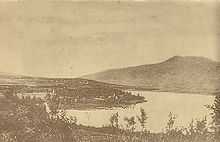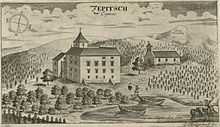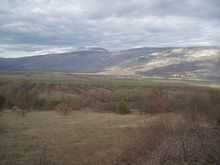Lake Čepić

Lake Čepić (Croatian: Čepićko jezero, Raško, Kožljansko, Sisolsko, Italian: Lago d'Arsa) was the only natural lake in Istria, Croatia. It was drained in 1932 with a tunnel long 4,250 metres near Plomin to the sea. The surface of the vast green valley was transformed into fertile field for agriculture. The field surface area is around 7 km² (24 m.a.s.l.), and into it flows Boljunčica river, while from it Raša river.
History
The lake was located in the Eastern part of Istria, on the western and south-western slopes of Učka mountain (to the west of uplift Sisol, 833 m.a.s.l.). South of the lake (now field) is the town Kršan, to the east the ruins of Kožljak castle, while to the west and north was the Pauline monastery of St. Mary, and villages Čepić, Kostrčani, Brdo Jesenovik, Nova Vas and Šušnjevica, mostly inhabited by Istro-Romanians.
The lake surface area was between 5,4 and 8,6 km², depending on the precipitation and the water supply from Boljunčica river. Its width was 2,5 km² at most, while length nearly 4 km². The depth of the lake was between 1 and no more than 2,5 metres. The lake was covered with reed and sedge, and was rich in fish (eel, carp, chub), and birds (wild duck, white stork, swan). However, it was also known for malarial mosquitoes and flooding.
The lake was recorded in the old topographic maps, the oldest from 1525 and 1563. In 1679 by Valvasor engravings as Zhepizer See, later as Sisol lake, and Gessaro in 1753. The first documents about lake drainage dates to the end of 18th century by Austria and Venice. In 1898, during the rule of Austria, was developed the project to halve the lake surface to around 300 ha. In 1899 was accepted by Istrian parliament, and the work began in 1902, but was stopped in 1908 due to lack of financial support. When Istria came under the rule of Italy in 1918, in 1920 was established consortium for the arrangement of the stream of river Raša, Conzorzio di Bonifica del Sistema dell' Arsa, and the work on the new project began in 1928.
The tunnel which extended from the southern point of the lake to the gulf of Plomin was long 4,560 metres, it was built by between 96 and 262 workers per year, and was finished after four years in October 1932. The dam was pierced on 11 December of the same year, and the water mass reached the gulf after 26 minutes. In January 1933, the lake water, in total 20 million cubic metres, drained almost completely.
Gallery
-

Čepić, with boats and fishermen on the lake
-

The field seen from village Jesenovik
-
Panorama of the field seen from Kožljak
References
- Milevoj, Marijan (2014). S ove strane Učke [On this side of Učka] (in Croatian). Labin: Mathias Flacius. p. 77-81. ISBN 978-953-6875-54-2.
- Načinović, Danijel. "Čepić - Cepich (Felicia)". IstriaNet (in Croatian, English). Retrieved 26 January 2015.
- Other sources
- "Čepićko polje" (in Croatian). Croatian Encyclopedia.
- "Čepićko polje" (in Croatian). Istrian Encyclopedia. 2008.
External links
 Media related to Čepićko polje at Wikimedia Commons
Media related to Čepićko polje at Wikimedia Commons
